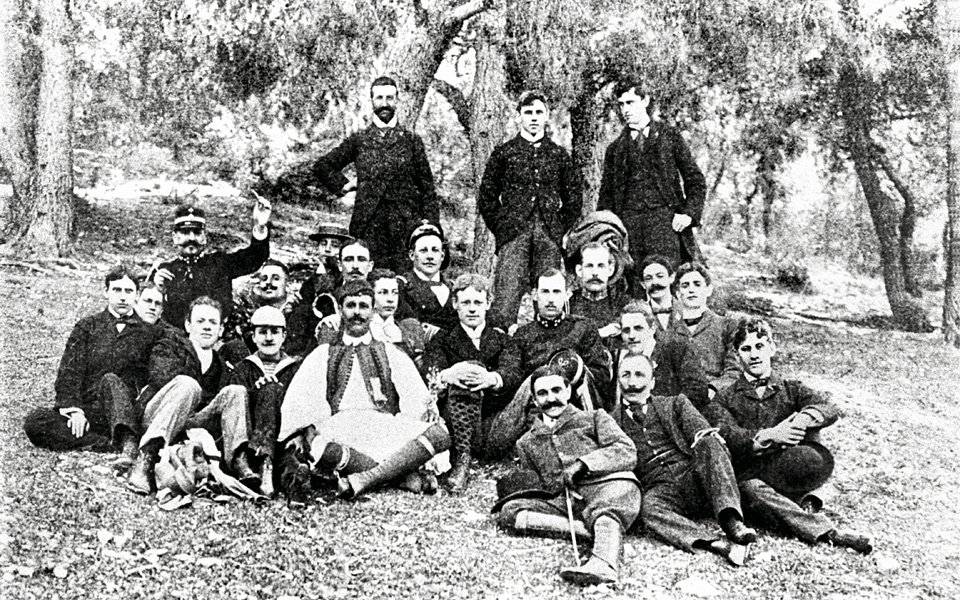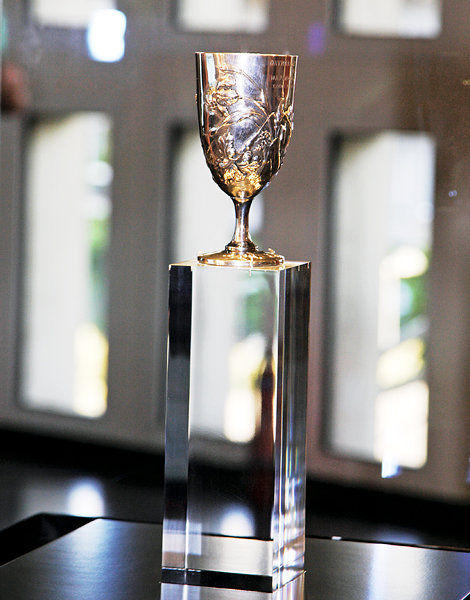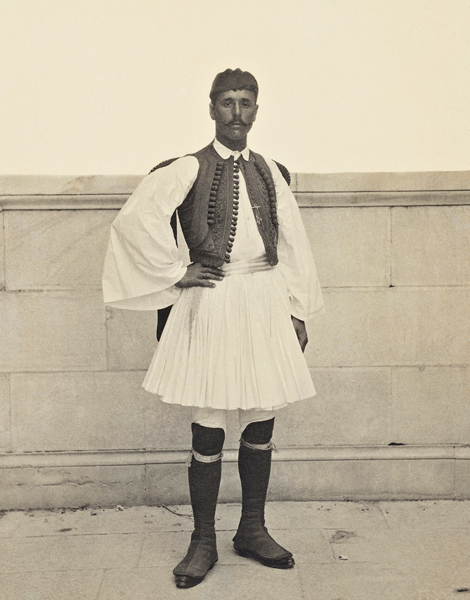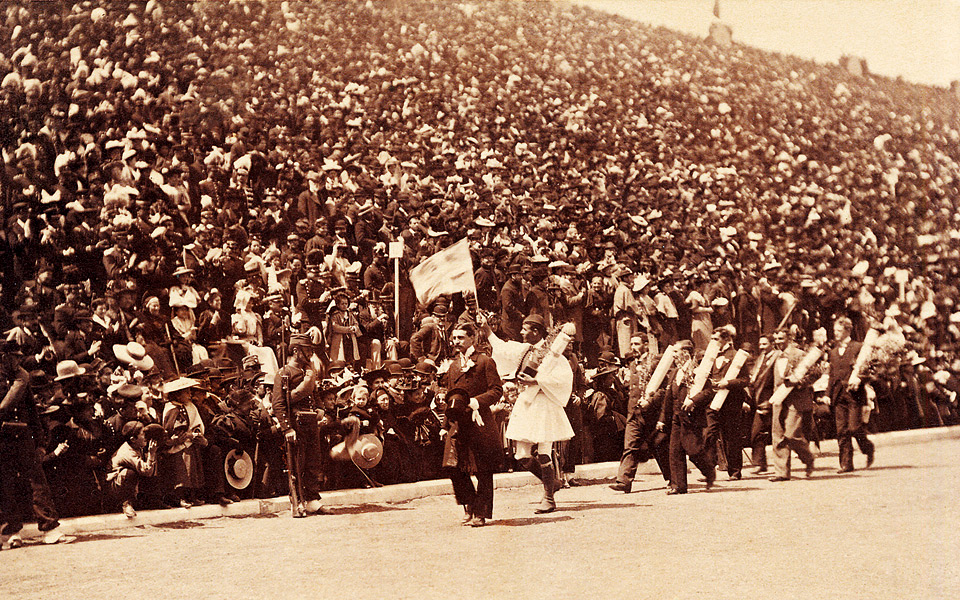For most Greeks, the name Spyros Louis, winner of the Marathon event at the first modern Olympics, is associated with speed, as illustrated by the common expression that someone “became Louis,” meaning “sped off” or “vanished.” When this tall, striking runner entered the Panathenaic Stadium in 1896, he became an instant folk hero. But who was the man behind the athlete who left such a formidable legacy?
First of all, he was not an athlete as such. Spyros Louis was born into a poor family in Maroussi in 1873. Today, Maroussi has become an affluent northern suburb of Athens, but back then it was only a small village known for its pleasant climate and mineral water. In fact the fine quality of the water, in combination with a drought that had struck the city at the time, created a great demand in the center for water from Maroussi. It was transported on carts by men dressed in traditional pleated skirts, one of whom was Spyros Louis. He also helped his parents, Athanasios and Kalomira, run their modest farm. Louis was the youngest of five siblings and his formal education went no further than primary school. He apparently loved celebrations and dancing, was warm-hearted, generous, principled, and, of course, an outstanding runner.
These qualities brought Louis to the attention of an army colonel, by the name of Papadiamantopoulos, when he was doing his military service at a unit on the outskirts of Athens. It is believed that the soldier’s reputation as a fast runner with endurance became well-established in the army. Papadiamantopoulos took Louis under his wing and made the most of the young man’s physical prowess. Every morning he would send the conscript to downtown Syntagma Square for his newspaper, cigarettes and other items. Although this amounted to a considerable distance of many kilometers, it soon became clear that Louis was covering it more and more quickly.
After being discharged from the army, Louis returned to Maroussi and his old daily routine. Having never formally participated in sporting competitions, it did not occur to him to take part in the Panhellenic Games, staged in early March, 1896 as a qualifying event for the forthcoming Olympic Games. Motivated, however, by his former commanding officer, as well as by his love for a girl called Eleni, Louis took part in a second Olympic trial held not long afterward, on 25 March. It appears he wanted to sway the opinion of the girl’s auntie/stepmother, who held an unfavorable view of the young man as a potential husband for her niece.
The Marathon had been established as an Olympic event at the suggestion of French philhellene Michel Breal, at an International Athletics Conference at the Sorbonne, Paris in 1894. The conference also unanimously adopted a proposal by the newly formed International Olympic Committee (IOC) that the first modern Olympic Games be hosted by Athens. Breal pushed for the creation of a special cup for the winner of the marathon race, but this idea deviated from the position taken by Pierre de Coubertin, father of the modern Olympics and founder of the IOC, who wished for all winning athletes to be awarded medals, diplomas and olive wreaths.
“The visiting runners appear to have been unaccustomed to the challenges of a course featuring different altitude levels and such rugged terrain, while Louis felt completely at home.”

© Getty Images/Ideal Image
Nevertheless, a silver cup, financed by Breal himself, was crafted and engraved with the words: “Olympic Games, 1896, Marathon Race, Donated by Michel Breal”. The cup’s surface was adorned with birds and aquatic plants which, according to historical sources, had lived in Marathon’s marshland since ancient times. This work of art also served as a reminder of the historic Battle of Marathon in 490 BC, and the messenger who, the story goes, covered approximately 42 kilometers to announce to Athenians the victory of the Greeks over the Persians, before he collapsed and died of exhaustion.
One day before the Marathon race of the first modern Olympics, participants, locals and visitors gathered at Marathon and dined in the handful of tavernas operating in the area. As for Louis, legend has it that he opted to prepare for the race by fasting and praying. He apparently spent the previous night in front of religious icons.
On the day of the race, 10 April, at 2 pm, Colonel Papadiamantopoulos gave runners the starting signal. A number of renowned foreign athletes led the way early on, while Louis and other amateur Greek runners lagged behind. Among the visiting athletes were Australian Edwin Flack, who had already won the 800m and 1,500m events at this first modern Olympiad, American Thomas Blake, winner of the 400m race, Frenchman Albin Lermusiaux, and Hungary’s Gyula Kellner, who would end the Marathon in third place. The runners were escorted during the race by cavalry officers and soldiers, while medical units, set up on carriages, were stationed at various points along the course, in case exhausted runners had to drop out. Quite a few runners ended up doing so.
The visiting runners appear to have been unaccustomed to the challenges of a course featuring different altitude levels and such rugged terrain. Some were also delayed by the warm reception extended to them by a group of farmers in a celebrative mood at a village along the way. Louis, it is believed, benefited from this delay, “quenched” his thirst with a glass of wine at some point, and felt completely at home as he covered a particularly grueling uphill section of the course. By the time he reached the streets of Athens, Louis, spurred on by the locals, had taken over the lead.
Complete silence fell over the Panathenaic Stadium as 60,000 spectators waited anxiously for the runners to begin arriving at the finish line. King George I and many VIPs turned their binoculars to the stadium’s entrance where Constantine, the Crown Prince, along with Prince George and Prince Nicholas, were waiting to accompany the winner into the arena. Suddenly, a voice exclaimed: “He’s a Greek!” Spyros Louis ended the race looking strong, in a time of 2:58:50. His compatriot, Harilaos Vassilakos, finished second.
TRIVIA
The Olympic Athletic Center of Athens, which hosted the 2004 Games, has been named after Spyros Louis.


© Albert Meyer/Benaki Museum Photographic Archives
Wild rejoicing erupted in the stadium. Many spectators shed tears of joy. Even the normally reserved George I decided to dispense with formalities, tossing his admiral’s hat into the air and warmly embracing his wife Queen Olga. Many jubilant onlookers from the stadium’s lowest tiers spilled onto the track to carry the winning athlete during his victory lap.
“I will never forget that scene and no longer have any doubts that mental powers exist to play a far greater role in sports than what we generally believe,” Coubertin remarked on Louis’ triumph.
Chicago University Professor John MacAloon, an authority on the Olympic Games, has suggested that the marathon’s finale was the most significant moment of the 1896 Olympics. No other competitive event on the Olympiad’s agenda drew such focused attention, and, in doing so, recreated the excitement of the opening ceremony. The Marathon provided a unique spectacle and served as a potent reminder of the true spirit of the Olympics, even vindicating the efforts made for their revival. Most certainly, Louis’ epic victory added immensely to the positive impression left by the 1896 Marathon race. And this impression helped to ensure the continuation of the Olympic Games through their difficult early period.
MacAloon writes: “Without Louis, the Athens Games would have no epic hero, no master symbol to condense and express so richly so many ideological, sociological, and historical themes. While it is not clear how thoroughly he recognized it, Coubertin had found his most potent ally in the peasant from Maroussi. Indeed, it may be fairly said of Louis that, more than any man but Coubertin, he created the modern Olympic Games.”
Louis did not remain in Athens to celebrate his triumph, but instead chose to return to Maroussi, where an all-night celebration was staged. He lived in Maroussi for the rest of his life, serving as a local police officer and working on his small farm. After the death of his beloved Eleni, Louis ended up a very poor man, since he had sold most of his property to pay for her medical treatment when she had fallen ill.
He briefly reemerged from obscurity for the Berlin Olympics in 1936, as a guest of honor in what was his last public appearance. Dressed in a traditional pleated skirt, Louis handed an olive wreath to Adolf Hitler, not realizing, like most people at the time, that this symbol of peace was being offered to the man who would soon be responsible for so much bloodshed in Europe.
Greece’s most revered Olympic champion passed away in Maroussi in 1940. His prize, the Breal cup, was kept there by his descendants as a family heirloom for over 100 years. In 2012, presumably for financial reasons, the legendary runner’s grandson commissioned Christie’s to sell the cup. It was acquired by the Stavros Niarchos Foundation for over €600,000, a purchase that broke the auction record for Olympic memorabilia and ensures this precious symbol will remain in the country that gave birth to the Olympic Games.
“Complete silence fell over the Panathenaic Stadium as 60,000 spectators waited anxiously for the runners to begin arriving at the finish line… Suddenly, a voice exclaimed: ‘He’s a Greek!’”











